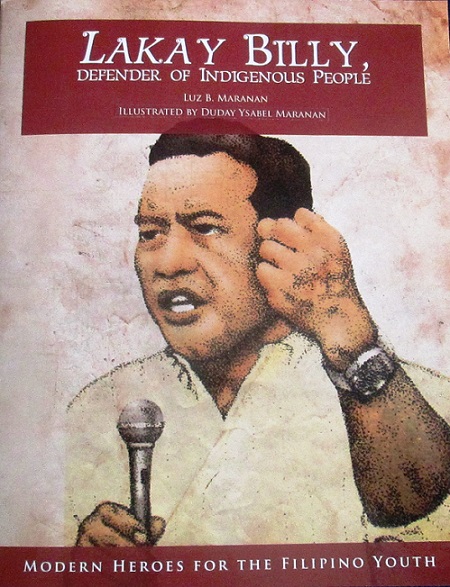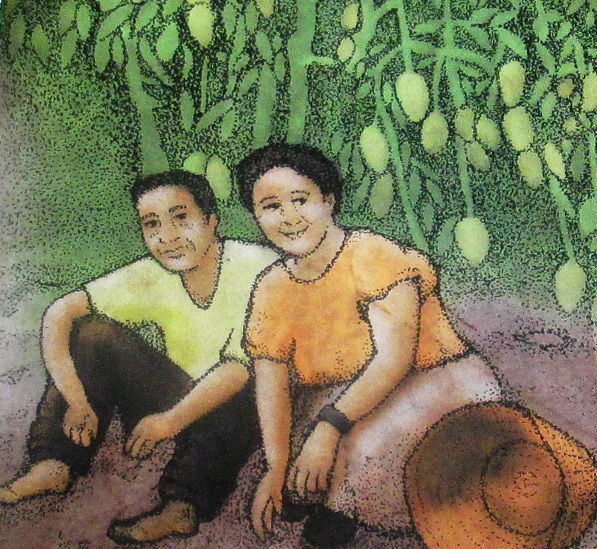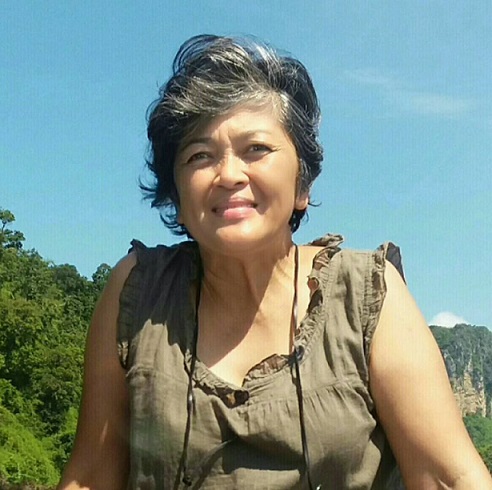The common thread of Luz B. Maranan’s three books in Bookmark’s children’s series on contemporary Filipino heroes is the subjects’ deeply felt love for the country and its people.
The author began with The Pangat, the Mountains and the River about Kalinga’s Macliing Dulag, who led the opposition to the World Bank-funded Chico River Dam in the 1970s, followed by A Voice of Hope in a Time of Darkness about feminist musician Susan Fernandez, who went beyond being a teacher and was part of the anti-dictatorship movement in the 1980s until her death in 2009.
The latest is Lakay Billy, Defender of Indigenous People about the late lawyer William “Billy” F. Claver, a staunch Igorot human rights lawyer and legislator who wrote the Indigenous People’s Right Act (IPRA). (“Lakay” is the Iluko word for a revered “old man.”)

Cover of Lakay Billy, Defender of Indigenous People
Asked if the subjects are her personal choices, Maranan assented, saying, “I asked Bookmark if I could write about Macliing. For me he sparked the Kaigorotan consciousness that galvanized the indigenous people’s movement in the Cordillera of which I’m part of, though I am non-indigenous. The same is true with Lakay Billy, founding chair of the Cordillera People’s Alliance. Both contributed much to the defense of land, life and resources of the region’s IPs. Of Susan, she was militant with her sweet and inspiring voice.”
She recalled the first time she met Claver during martial law when she was doing what was known in the resistance movement as “semi-legal” work in the early ’80s in Tabuk, Kalinga. She was under surveillance by the local intelligence unit and Civilian Home Defense Forces. Comrades advised her to quickly get in touch with Atty. Claver.
Upon greeting him at his Tabuk office, his first words to her were: “First, you have to reveal your true identity to me, your real name, and we’ll proceed.” Maranan felt safe. In Bontoc where he had an office, her collective would seek his advice on various issues.
His eldest son Ayangwa or Ayan was Maranan’s good friend when they did support work for the region in Manila. But he was murdered by the Cordillera People’s Liberation Army (CPLA) years after.

Young Billy and Jane Claver in their mango orchard in Kalinga as rendered by Duday Isabel Maranan.
The Maranan and Claver families would later become related through the marriage of Lakay Billy’s nephew Frank to Luz’s sister Lingling. The older Claver was father figure to Frank and siblings, their own father having died in the early ’80s. Edgardo Maranan, Luz and Lingling’s eldest brother, became Lakay Billy’s speech writer during his stint in Congress.
Are there other lawyers continuing Lakay Billy’s fight? Maranan said, “Yes, there are the likes of Rene Cortes and Jose Molintas. They encourage young lawyers to go into human rights lawyering. Here in the region we have the National Union of People’s Lawyers and DINTEG which stands for Cordillera Indigenous Peoples Legal Center with lawyers handling cases on ancestral land rights, besides human rights violation cases.
Since the time Lakay Billy died in 2011, Maranan assessed that his IPRA, supposed to protect the IPs’ right to their ancestral domain, “has waned, or is even ignored or twisted, at the rate development aggression is imposed on the Cordillera peoples’ homeland. To implement foreign ventures in energy and mining projects, the government has designated the Armed Forces of the Philippines and CPLA as security forces to ensure that no opposition or people’s resistance get in the way of these projects. Legitimate people’s organizations that safeguard their communities from extractive operations of these foreign corporations are tagged as communist supporters. Lakay Billy would’ve faced up to these aggressors and the government and tell it to their faces that they are the biggest landgrabbers!”
She continued, “The ferocity and ruthlessness of the AFP in the countryside is such that lawyers are not spared from their murderous rampage. IP organizations and lawyers’ groups must not be cowed. Inter-tribal unity must be revived as in the days of the Chico struggle, their customary and traditional systems revitalized, and greater solidarity with national and global support groups must be harnessed.”

Author Luz B. Maranan
Maranan is vice chair of the Dap-ayan ti Kultura iti Cordillera (Center for Culture in the Cordillera), an allied organization of the Cordillera Peoples Alliance. Her duties involve organizing cultural groups in schools and communities, doing alliance work with artists for them to participate in DKK’s advocacy and facilitating workshops on indigenous culture, theater and performance arts. She reads poetry in fora and rallies, for storytelling and to talk about children’s literature.
Being a grandmother makes her doubly persistent in writing these stories about heroes youngsters know little about. She said, “I worry a lot about my grandson Alab’s penchant for DC and Marvel superheroes. I compete with these Western giants by insisting on reading Filipino stories to him at bedtime. He thinks The Pangat is a very serious story. He was pensive when I closed the book. He has basic concepts about defense of territory, good and bad soldiers, that heroes are not necessarily superheroes. Maybe I should also write funny stories for him.”
Her next subjects are the ones her late Kuya Ed left unwritten. She will write about nationalist botanist-plant taxonomist Leonard Co, gunned down by the military while on a biodiversity project in Leyte in 2010. To follow is a story on Evelio Javier. Lastly, she has lined up the life of Petra Tannao Macliing, a Bontoc woman leader who led her village against mining companies in Mainit and against the Chico Dam, together with Macliing Dulag. (They are not related.)
Apart from these, she is also editing KALI, an anthology of poems and stories on the Cordillera women, to be published by the Cordillera Women’s Education, Action and Research Center, due for publication in December. She is the team leader of TUKLAS-DKK Innovation Labs Project in Loacan, Itogon, doing cultural and creative workshops for children and youth in mining affected communities